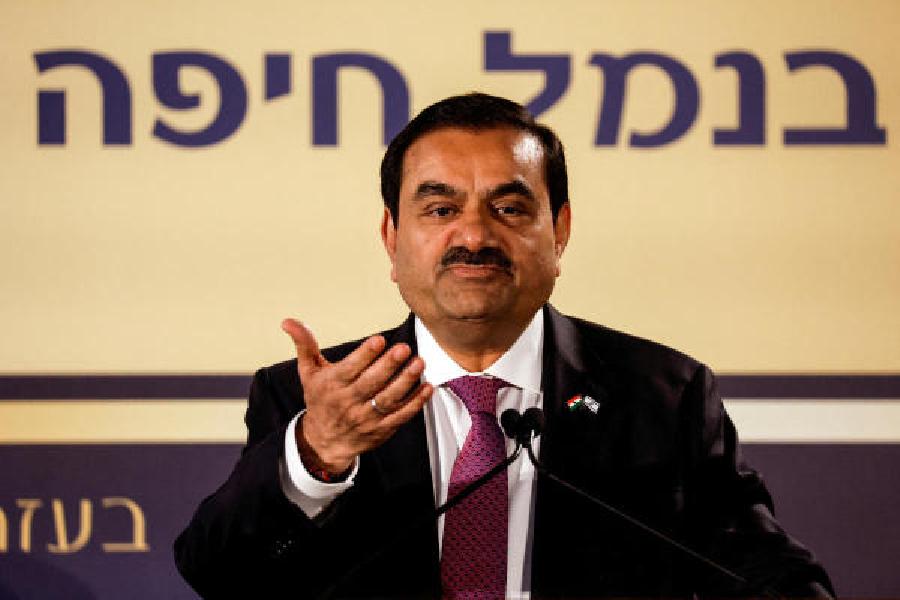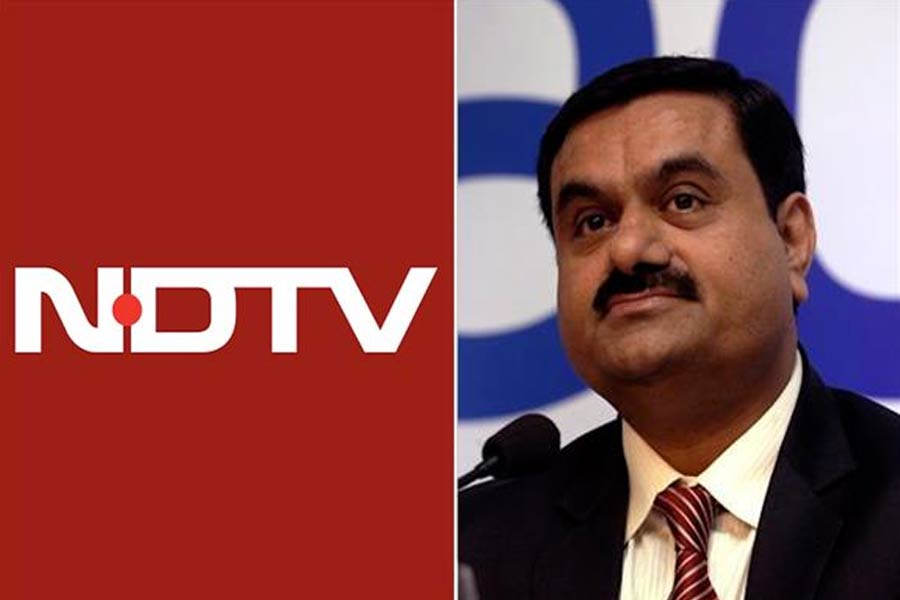The Adanis have been sucked into another controversy over their “apparent failure” to report related party dealings involving Paridhi Adani, wife of Gautam Adani’s elder son Karan, and her father’s reputable law firm Cyril Amarchand Mangaldas where she works.
Besides, a question has been lobbed by Hindenburg Research founder Nate Anderson in a tweet on Monday asking whether the unnamed law firm that gave a clean chit on related party transactions within the group was Cyril Amarchand Mangaldas.
The latest controversy has arisen over another farrago of questions linked to related party associations between the Adanis, on the one side, and Paridhi and the firm Cyril Amarchand Mangaldas, on the other.
The Adanis believe these questions are unnecessary, irregular and irrelevant and have indicated that no such disclosures were required in the first place because Paridhi — although married to Karan — holds no official position within the group.
These disclaimers were issued in response to questions that Bloomberg commentator Andy Mukherjee had raised with the group and worked into an article titled “Why doesn’t Adani disclose potential conflicts?”
Paridhi Adani is a partner at Cyril Amarchand Mangaldas and heads its Ahmedabad practice.
According to her profile on the legal firm’s website, she has advised the Adani group on Adani Ports’ acquisition of a 75 per cent stake in Krishnapatnam Ports Ltd; Adani Green Energy’s joint venture agreement with Total SA of France for solar projects; and the Adani family and Adani Gas on Total Holdings SAS’s acquisition in February 2020 of a 37.4 per cent in the group entity.
US-based short seller Hindenburg Research’s founder Nathan “Nate” Anderson seized on Mukherjee’s report and wondered whether statutory auditors like Deloitte Haskin & Sells at Adani Ports, and Shah Dhandaria & CO LLP at group flagship Adani Enterprises, had been stymied from asking uncomfortable questions about related party deals because of a clean chit issued by the unnamed legal firm.
“Adani responded to our report by saying an ‘independent’ law firm gave it the all-clear,” Nate Anderson said in his tweet, referring to the January 24 report that levelled a tsunami of allegations against the Adani group that eventually wiped out almost $153 billion of the combined valuation of the group’s listed companies over a tumultuous period between February and mid-March before the stock markets and the Adani group shares recorded a sprightly recovery.
“Bloomberg asked if the claimed ‘independent’ firm was CAM (Cyril Amarchand Mangaldas), where Gautam Adani’s daughter-in-law is partner and her father Cyril Shroff heads the firm. Adani failed to answer. Why?” Anderson added in his tweet.
The Hindenburg founder tagged a screenshot of a statement issued on May 2 by Pranav Adani, director at Adani Total Gas Ltd, highlighting a line that read: “To uphold the principles of good governance, Adani Group had undertaken review of transactions referred in the short seller’s report (including that of the company, meaning Adani Total Gas) through an independent assessment from a law firm. The report confirms company’s compliance of applicable laws and regulations.”
Several questions have now burst into the open: did the Adanis need to disclose the name of the law firm that issued this “independent opinion”? If the opinion was issued by Cyril Amarchand Mangaldas, could the law firmbe labelled as a “connected” or a “related party” itself because of Paridhi’s link through marriage with the Adani family?
Reached by this newspaper for comment on the Bloomberg opinion piece and Nate Anderson’s subsequent tweet, an official from the Adani group said they would not like to comment at this stage.
However, a spokesperson from the conglomerate had in response to questions posed by the Bloomberg writer said that his conclusions were misleading, adding that his “insinuations and aspersions concerning potential conflicts of interest with CAM or any other law firm or its partners are unfounded”.
The Bloomberg report says that opinion within the legal fraternity is itself divided on whether or not the Adanis were obligated to make disclosures involving Paridhi and Cyril Amarchand Mangaldas.
The latest controversy comes at a time when at least two firms from the Adani group are all set to raise funds from foreign investors and the bellwether indices of the Indian stock market likethe Sensex and Nifty 50 are poised to scale another all-time peak.
Shareholders of Adani Enterprises and Adani Transmission have approved plans to raise a cumulative Rs 21,000 crore through a qualified institutional placement (QIP). Another group firm — Adani Green Energy — is also expected to raise funds in the near future.
Semantics
Wordplay, semantics and carefully nuanced statements issued by the Adani group and the statutory auditors of the group companies — sometimes conflicting in their claims — appear to have muddled the prospects for clarity on the issue.
At issue is the use of just one word — “independent” — and the words and phrases that this adjective qualifies. The word is slipped into different portions in the sentence, depending on who is making the statement. The shifting syntax changes the meaning of each assertion and raises subtle lexical ambiguities for the keen grammarian.
For starters, it seems that there was not one but possibly several legal firms consulted by various Adani group entities to validate and certify that their related party transactions were above board and in compliance with all extant regulations.
The Telegraph found that each of the listed Adani group companies, except for the newly listed Adani Wilmar, had secured legal opinion or opinions reviewing the transactions referred to in the Hindenburg report “to uphold the principles of good governance”.
Two entities — Adani Total Gas and flagship Adani Enterprises Ltd — said in the notes to their financial results that they had secured opinion from one law firm.
Both firms issued an identical statement that read: “To uphold the principles of good governance, the Group had undertaken review of transactions referred in the short seller’s report through an independent assessment by a law firm.”
Clearly, the grammarian might say, the word “independent” qualifies the term assessment and not the law firm.
In some entities, the claims by the company management and the auditor were in conflict.
The notes to the financial results published by four other firms — Adani Power, Adani Transmission, Adani Green and Adani Ports and Special Economic Zone (APSEZ) — suggest that these companies had obtained opinions from more than one law firm.
For instance, in Adani Ports and SEZ Ltd (APSEZ), where Karan Adani is the chief executive officer, it was stated: “Separately, to uphold the principles of good governance, Adani Group has undertaken review of transactions (including those for the company and its subsidiaries) with parties referred in the short seller’s report including relationships amongst other matters and obtained opinions from independent law firms. These opinions confirm that the company and its subsidiaries are in compliance with the requirements of applicable laws and regulations.”
The auditors’ reports in at least two instances, however, appear to indicate that the opinion came from only one law firm.
While describing the basis for its qualified opinion on the related party issue, Deloitte Haskins & Sells LLP said in the case of APSEZ: “The company has represented to us that there is no effect of the allegations made in the short seller report on the statement based on their evaluation and after consideration of a memorandum prepared by an external law firm on the responses to the allegations in the short seller report issued by the Adani Group.”
It is important to note that Deloitte chose to describe the law firm only as “an external law firm”.
The other instance was at Adani Transmission Ltd and the auditor was once again Deloitte Haskins & Sells LLP.











